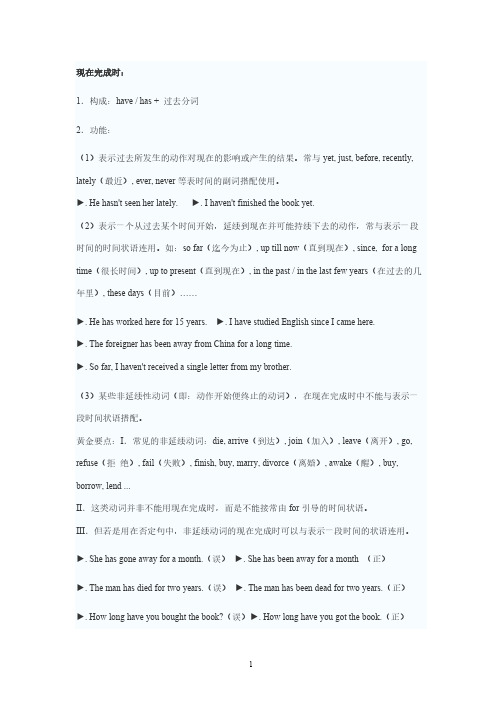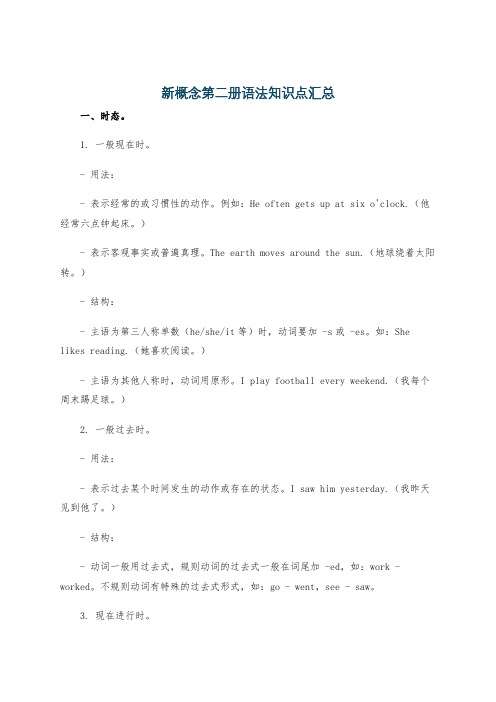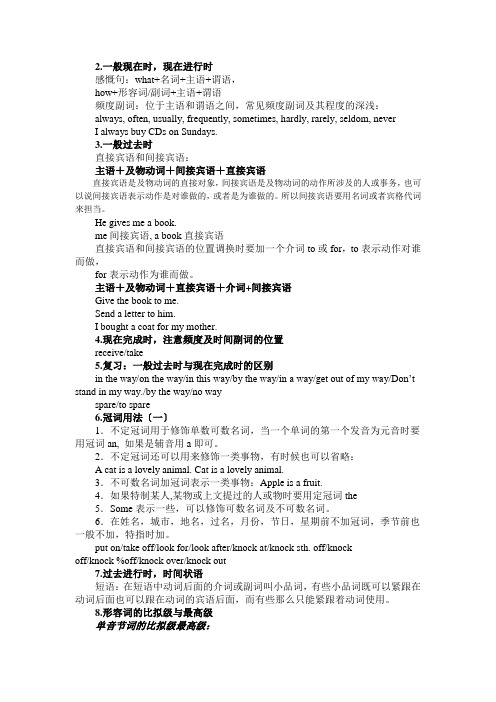新概念英语第二册语法解析及练习题:过去完成时
新概念第二册语法解析及练习而今完成时

现在完成时:1.构成:have / has + 过去分词2.功能:(1)表示过去所发生的动作对现在的影响或产生的结果。
常与yet, just, before, recently, lately(最近), ever, never等表时间的副词搭配使用。
►. He hasn't seen her lately. ►. I haven't finished the book yet.(2)表示一个从过去某个时间开始,延续到现在并可能持续下去的动作,常与表示一段时间的时间状语连用。
如:so far(迄今为止), up till now(直到现在), since, for a long time(很长时间), up to present(直到现在), in the past / in the last few years(在过去的几年里), these days(目前)……►. He has worked here for 15 years. ►. I have studied English since I came here.►. The foreigner has been away from China for a long time.►. So far, I haven't received a single letter from my brother.(3)某些非延续性动词(即:动作开始便终止的动词),在现在完成时中不能与表示一段时间状语搭配。
黄金要点:I.常见的非延续动词:die, arrive(到达), join(加入), leave(离开), go, refuse(拒绝), fail(失败), finish, buy, marry, divorce(离婚), awake(醒), buy, borrow, lend ...II.这类动词并非不能用现在完成时,而是不能接常由for引导的时间状语。
新概念英语第二册语法解析及练习题:过去完成进行时

新概念英语第二册语法解析及练习题:过去完成进行时过去完成进行时:had been + 现在分词表示过去某个时间之前一直在进行的动作。
● She said that she had been typing a paper before I came in.比较:. The girl had cleaned up the room, so it was tidy.. The girl had been clearing up the room, so we had to wait outside.练习:1. It ________ for four days when we arrived, so the roads were very muddy.A. was rainingB. would be rainingC. had been rainingD. has rained2. He told us that he ________ there since 1982.A. has been livingB. had been livingC. would have livedD. was living3. He had been learning English for 3 years before he came here and________ now.A. is still learningB. had been learningC. was still learningD. has been learning4. By the end of last week, he ________ in the company for 10 years.A. had workedB. had been workingC. will have workedD. would have worked5. Not until then did people know that he ________ important military information to the enemy for a long time.A. soldB. would sellC. had soldD. had been selling答案:1. C2. B3. A4. B5. D。
新概念第二册语法知识点汇总

新概念第二册语法知识点汇总一、时态。
1. 一般现在时。
- 用法:- 表示经常的或习惯性的动作。
例如:He often gets up at six o'clock.(他经常六点钟起床。
)- 表示客观事实或普遍真理。
The earth moves around the sun.(地球绕着太阳转。
)- 结构:- 主语为第三人称单数(he/she/it等)时,动词要加 -s或 -es。
如:She likes reading.(她喜欢阅读。
)- 主语为其他人称时,动词用原形。
I play football every weekend.(我每个周末踢足球。
)2. 一般过去时。
- 用法:- 表示过去某个时间发生的动作或存在的状态。
I saw him yesterday.(我昨天见到他了。
)- 结构:- 动词一般用过去式,规则动词的过去式一般在词尾加 -ed,如:work - worked。
不规则动词有特殊的过去式形式,如:go - went,see - saw。
3. 现在进行时。
- 表示现在正在进行的动作。
Look! She is dancing.(看!她正在跳舞。
)- 结构:- be动词(am/is/are)+动词的 -ing形式。
He is reading a book.(他正在读一本书。
)4. 过去进行时。
- 用法:- 表示过去某个时刻或某段时间正在进行的动作。
At that time yesterday, I was doing my homework.(昨天那个时候,我正在做家庭作业。
)- 结构:- was/were+动词的 -ing形式。
They were playing football at threeo'clock yesterday afternoon.(他们昨天下午三点正在踢足球。
)5. 现在完成时。
- 用法:- 表示过去发生的动作对现在造成的影响或结果。
I have lost my key.(我把钥匙丢了。
新概念英语第二册语法知识点汇总

新概念英语第二册语法知识点汇总本文档将对《新概念英语第二册》中的语法知识点进行汇总。
以下是该册教材中的重要语法知识点:1. 时态- 现在完成时:表示过去发生的事情对现在产生的影响,构成为"have/has + 过去分词"。
- 过去完成时:表示过去某个时间或事件之前发生的动作或状态,构成为"had + 过去分词"。
- 将来进行时:表示将来某个时间正在进行的动作,构成为"will be + 动词-ing"。
2. 句型- There be句型:表示某处存在某物或某人,构成为"There + be 动词 + 宾语"。
- 虚拟语气:表示与事实相反的假设、愿望或建议的语气,构成为"if + 主语 + 过去式,主语 + would/could/might + 动词原形"。
3. 名词- 可数名词与不可数名词:可数名词可以同时使用单复数形式,而不可数名词只能使用单数形式。
- 复合名词:由两个或更多个词构成的名词,如"homework"、"football"等。
4. 冠词- 定冠词:表示特指的冠词,如"the"。
- 不定冠词:表示泛指的冠词,如"a/an"。
5. 代词- 主格代词:在句子中作主语,如"I"、"you"等。
- 宾格代词:在句子中作宾语,如"me"、"you"等。
- 物主代词:表示所属关系的代词,如"my"、"your"等。
6. 动词- 不定式:表示动作的动词原形,可以作主语、宾语等,如"to eat"。
- 动词的时态变化:根据不同的时态,在动词前加不同的助动词,如"is/am/are"表示现在进行时。
新概念英语第二册语法详解和总结

2.一般现在时,现在进行时感慨句:what+名词+主语+谓语,how+形容词/副词+主语+谓语频度副词:位于主语和谓语之间,常见频度副词及其程度的深浅:always, often, usually, frequently, sometimes, hardly, rarely, seldom, neverI always buy CDs on Sundays.3.一般过去时直接宾语和间接宾语:主语+及物动词+间接宾语+直接宾语直接宾语是及物动词的直接对象,间接宾语是及物动词的动作所涉及的人或事务,也可以说间接宾语表示动作是对谁做的,或者是为谁做的。
所以间接宾语要用名词或者宾格代词来担当。
He gives me a book.me间接宾语, a book直接宾语直接宾语和间接宾语的位置调换时要加一个介词to或for,to表示动作对谁而做,for表示动作为谁而做。
主语+及物动词+直接宾语+介词+间接宾语Give the book to me.Send a letter to him.I bought a coat for my mother.4.现在完成时,注意频度及时间副词的位置receive/take5.复习:一般过去时与现在完成时的区别in the way/on the way/in this way/by the way/in a way/get out of my way/Don’t stand in my way./by the way/no wayspare/to spare6.冠词用法〔一〕1.不定冠词用于修饰单数可数名词,当一个单词的第一个发音为元音时要用冠词an, 如果是辅音用a即可。
2.不定冠词还可以用来修饰一类事物,有时候也可以省略:A cat is a lovely animal. Cat is a lovely animal.3.不可数名词加冠词表示一类事物:Apple is a fruit.4.如果特制某人,某物或上文提过的人或物时要用定冠词the5.Some表示一些,可以修饰可数名词及不可数名词。
新概念英语第二册语法总结及练习(12)

新概念英语第二册语法总结及练习(12)将来完成时:shall / will have + 过去分词表示将来某时之前已经完成的动作。
. They will have been here for 5 years next Friday.. By the end of next term, the students will have finished the book.过去将来完成时:would / should have + 过去分词表示从过去某个时间看将来某时之前已经完成的动作。
He said that they would have arrived by seven o'clock.练习:1. By the end of this year,I ____enough money for a holiday.A will saveB will be savingC will have savedD have saved2. I have been studying here for four years,by next summer I ____A shall graduateB shall be graduatedC shall be graduatingD shall have graduated3. I hope her health _______greatly by the time we come back next year.A improvesB improvedC will be improvedD will have improve4. Pick me up at eight o'clock, I ______ my bath by then.A) will have had B) will be having C) can have had D) may have5. By the end of this month, we surely ___________ a satisfactory solution to the problem.A) have found B) will be finding C) will have found D) are finding答案:1.C 2.D 3.D 4. A) 5. C)。
(完整版)新概念英语第二册第47课练习
NCE2学习情况记载表练习一、从下面所给词汇中选择适当的词填在横线上。
Before, even though, for, since, because, when, while, though1.Why didn’t you come? —_________ my father wouldn’t let me.2.He didn’t hear the knock at the door ________ he was listening to the radio.3.________ he is rich, he is not very happy.4.________ he said so, you need not believe him.5.Think again _________ you do something.二、单项选择1. —Can I try on this pair of shoes?—Sorry, these shoes are not _______ sale.A. onB. forC. inD. at2. I was late for work ________ there was a traffic accident.A. sinceB. because ofC. due toD. because3. He said he heard someone _______ loudly in the next room.A. singsB. sangC. singingD. to sing4. —When _______ this kind of computer __________ ? —Last year.A. did; useB. was; usedC. is; usedD. are; used5. _______ the water _________ when you are brushing your teeth. Don’t let it waste.A. Turn; onB. Turn; offC. Turn; awayD. Turn; out6. The streets are all wet. It ___________ during the night.A. can’t have rainedB. couldn’t rainC. must have rainedD. needn’t rain7. He suggested _______ a visit to the museum the next day.A. payingB. to payC. payD. being paid8. I shall have to ______ these unpleasant working conditions.A. receiveB. realizeC. recognizeD. accept9. _______ I was in trouble, I always believed that things would change.A. As ifB. EvenC. In spite ofD. Even if10. They had ________ furniture for the small apartment.A. too muchB. much tooC. too manyD. many too二、把下列句子翻译成英语。
(完整版)新概念英语第二册:第14课课文详解及语法解析
新概念英语第二册:第14课课文详解及语法解析课文详注 Further notes on the text1.After I had left a small village in the south of France, I drove on to the next town.在离开法国南部的一个小村庄后,我继续驶往下一个城镇。
(1)表示一个大范围中的某一个地方时要用介词in:Beijing is in the north of China.北京位于中国的北部。
(2)副词on紧跟在动词后面时能够表示“向前”、“继续下去”等意义:He talked on until everybody had gone.他滔滔不绝地讲到大家都走了。
I was reading when my friend called. After he had gone,I went on to read.我朋友来看我时我正在看书。
他走了以后我便继续看书。
2.I stopped and he asked me for a lift.我把车停下,他向我提出要求搭车。
名词lift的含义之一是“(给步行者)搭便车”、“免费搭车”:Last night, I had to walk home. No one would give me a lift.昨晚我不得不走回家。
谁也不愿意让我搭车。
I was lucky today. I got a lift soon after I had leftthe village.我今天运气好,离开村子不久就搭上了便车。
3.As soon as he had got into the car, I said goodmorning to him in French and he replied in the same language.他一上车,我就用法语向他问早上好,他也同样用法语回答我。
(1)表示时间的固定短语as soon as通常表示“一……就……”,即两个动词之间相隔时间非常短:Tell him the news as soon as you meet him.你一遇见他就把这消息告诉他。
新概念英语第二册:第9课课文详解及语法解析
新概念英语第二册:第9课课文详解及语法解析课文详注 Further notes on the text1.…a large crowd of people had gathered under the Town Hall clock.……一大群人聚集在市政厅的大钟下面。
had gathered为过去完成时,表示过去某个时刻之前已经完成的动作。
(第14课语法) 2.It would strike twelve in twenty minutes' time.再过20分钟,大钟将敲响12下。
(1)这句话的时态为过去将来时。
(2)in+表示时间长度的短语可译为“……时间之后”,一般与将来时连用:Please wait a moment here. Jack will be back in a few minutes.请在此稍候。
杰克几分钟之后就回来。
(3)strike的基本含义是“打”、“击”:She struck the man in the face.她打了那人的脸。
当用于钟、乐器等东西时,它有“敲”、“弹”的含义:When I entered the room, the clock struck five.我进屋时,钟敲响了5点。
3.We waited and waited, but nothing happened.我们等啊等啊,可情况没有变化。
动词 happen作“发生”、“出现”讲时,主语是物:Have you heard what happened to Sam this morning?你听说今天上午萨姆发生了什么事了吗?An interesting thing happened last night.昨晚发生了一件有趣的事。
4.The big clock refused to welcome the New Year.那座大钟不愿意迎接新年。
这句话中的两个动词 refuse和welcome在一般情况下主语都是人。
新概念二lesson14过去完成时
• reply
• 1)回答答复 • She has replied to my letter • reply to a question • answer(用语言行为的)回答,答复跟宾语 • answer the door • answer the telephone
• journey 旅行 • 表示旅行的词语 • journey 长途的陆路旅行 • trip 短途的旅行
【课文讲解】
• 1、After I had left a small village in the south of France, I drove on to the next town. • 如果,主句和从句的两个动作都发生在过去: • (1)两个动作同时发生,用过去进行时. • (2)两个动作一前一后,发生在前的动作 用过去完成时。 • drive on 继续开往(on加在动词的后面表 示继续) • drive to 开车去某地 • 副词on紧跟在动词后面时可以表示“向前”、 “继续下去”等意义: •
• 【New words and expressions】
amusing [ə'mju:ziŋ] adj. 好笑的,有趣的 experience [iks'piəriəns] n. 经历 wave [weiv] v. 招手
lift [lift]
n. 搭便车
reply [ri'plai] v. 回答 language ['læ ŋɡwidʒ] n. 语言 journey ['dʒə:ni] n. 旅行
by the time 到……时候为止,指从过去某一点到, 从句所示的时间为止,这一时间段。when当……时 候,指过去的某一时间点。从句用一般过去时,主 句为过去完成时,表示主句的动作在从句的动作之
- 1、下载文档前请自行甄别文档内容的完整性,平台不提供额外的编辑、内容补充、找答案等附加服务。
- 2、"仅部分预览"的文档,不可在线预览部分如存在完整性等问题,可反馈申请退款(可完整预览的文档不适用该条件!)。
- 3、如文档侵犯您的权益,请联系客服反馈,我们会尽快为您处理(人工客服工作时间:9:00-18:30)。
新概念英语第二册语法解析及练习题:过去完成时
过去完成时:had + 过去分词
1.表示过去某个动作或某个具体时间之前已经发生、完成的动作。
“过去的过去”。
● They had got everything ready before I came.
● The play had begunbefore I got to the theater with my boyfriend.
2.过去完成时常用于 hardly / scarcely ... when, no sooner ... than等固定句型结构中。
(此乃超级重点句型,意为:“一……就”)● She had hardly / scarcely gone to bed when the bell rang.
● No sooner had he arrived at the railway station than he met her parents.
(注意 no sooner 在句首时句型倒装。
)
3.intend(打算),mean(意味),hope(希望),want(想要),plan(计划)等动词的过去完成时用来表示本打算做而没有做的事。
● I had intended to call on you yesterday, but someone came to see me just when I was about to leave.
(……原想昨天去看你……)
● They had planed to hold a football match last week, but they had to cancel it because the bad weather.
(……原计划上周举行一场足球赛……)
练习:
1. -Let's hurry! The president is coming. -Oh, I was afraid that we ________.
A. already miss him
B. had already missed him
C. will miss him already
D. have already missed him
2. Your letter came just as I ________ my office.
A. was leaving
B. would leave
C. had left
D. left
3. I ________ my keys, I can't remember where I last sawthem.
A. was losing
B. lost
C. had lost
D. have lost
4. Nobody knew where the teacher ________.
A. has gone
B. would have gone
C. had gone
D. would be gone
5. The sportsmen ________ training for 3 hours when the coach told them to break off for rest.
A. have been
B. are
C. had been
D. were
答案:
1. B
2. A
3. D
4. C
5. C。
